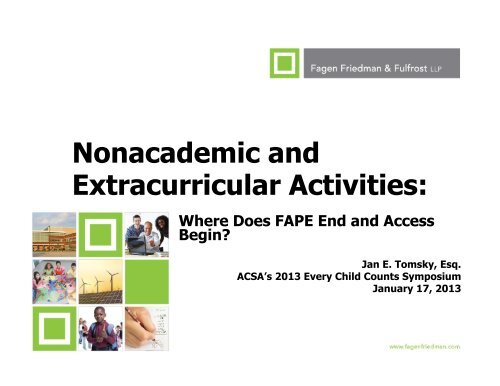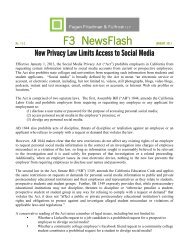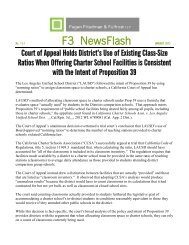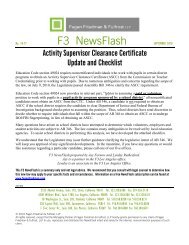Nonacademic and Extracurricular Activities: - Fagen Friedman ...
Nonacademic and Extracurricular Activities: - Fagen Friedman ...
Nonacademic and Extracurricular Activities: - Fagen Friedman ...
Create successful ePaper yourself
Turn your PDF publications into a flip-book with our unique Google optimized e-Paper software.
<strong>Nonacademic</strong> <strong>and</strong><br />
<strong>Extracurricular</strong> <strong>Activities</strong>:<br />
Where Does FAPE End <strong>and</strong> Access<br />
Begin?<br />
Jan E. Tomsky, Esq.<br />
ACSA’s 2013 Every Child Counts Symposium<br />
January 17, 2013<br />
1
<strong>Nonacademic</strong> <strong>and</strong> <strong>Extracurricular</strong> <strong>Activities</strong><br />
Historically, primarily an access/discrimination<br />
issue enforced by the Office for Civil Rights<br />
But FAPE under 504 still a potential issue<br />
2
Section 504:<br />
Nondiscrimination<br />
Section 504 of the Rehabilitation Act of 1973:<br />
“No otherwise qualified individual with a disability in the<br />
United States,…shall, solely by reason of her or his<br />
disability, be excluded from the participation in, be<br />
denied the benefits of, or be subjected to discrimination<br />
under any program or activity receiving Federal financial<br />
assistance”<br />
(29 U.S.C. § 794(a).)<br />
3
Section 504:<br />
Nondiscrimination<br />
Implementing regulations afford equal opportunity<br />
in nonacademic/extracurricular activities:<br />
Recipients of federal financial assistance “shall<br />
provide non-academic <strong>and</strong> extracurricular<br />
services <strong>and</strong> activities in such manner as is<br />
necessary to afford h<strong>and</strong>icapped students an<br />
equal opportunity for participation in such<br />
services <strong>and</strong> activities.”<br />
(34 C.F.R. §104.37(a)(1).)<br />
4
Section 504:<br />
Duty to Provide FAPE<br />
Required by USDE regulations<br />
Recipients of public funds<br />
Operating public elementary or secondary<br />
education programs<br />
Shall provide a free appropriate public education<br />
To each qualified h<strong>and</strong>icapped person<br />
Regarding of the nature/severity of the h<strong>and</strong>icap<br />
5
CASE EXAMPLES<br />
6
Lewis Palmer (CO) School District #38<br />
47 IDELR 111 (OCR 2006)<br />
Student with ADHD<br />
Behavioral problems included glaring at students,<br />
ripping paper<br />
Denied participation in out-of-town drama<br />
conference<br />
Per OCR: Denial was discriminatory<br />
7
Half Hollow Hills (NY) Central School District<br />
44 IDELR 220 (OCR 2005)<br />
Fifth grader with diabetes<br />
Missed one out of five field trips<br />
Was failure to provide a nurse a denial of FAPE?<br />
Per OCR: No<br />
8
Winooski (VT) School District<br />
46 IDELR 172 (OCR 2006)<br />
15-year-old 8 th -grader with a non-verbal learning<br />
disability <strong>and</strong> Asperger syndrome<br />
Student’s IEP required some paraprofessional<br />
assistance (not 1:1) for art, language arts, <strong>and</strong> for<br />
emotional/behavioral support during lunch <strong>and</strong><br />
upon arrival at school<br />
Student’s IEP did not require a 1:1 aide to support<br />
his student council activities or extracurricular<br />
activities such as the skiing program<br />
9
Winooski (VT) School District<br />
(cont’d)<br />
Parents filed complaint with OCR<br />
Alleged a denial of FAPE based on failure to<br />
implement IEP<br />
Failure to provide 1:1 aide to support participation<br />
on student council<br />
Failure to provide 1:1 aide in after-school skiing<br />
program<br />
10
Winooski (VT) School District (cont’d)<br />
OCR concluded that the district did not discriminate against<br />
the student by not providing a 1:1 aide, as the student’s<br />
IEP did not state that he needed 1:1 assistance for<br />
extracurricular activities<br />
However, OCR affirmed that districts have an obligation to<br />
provide disabled students with an equal opportunity to<br />
participate in nonacademic/extracurricular activities, which<br />
can include providing them assistance to participate<br />
effectively, even if the extracurricular activities in question<br />
are not listed in the student’s IEP or 504 plan<br />
11
S.S. v. Whitesboro Central School Dist.<br />
(N.D.N.Y 2012)<br />
Student with a severe anxiety disorder <strong>and</strong> fear of<br />
drowning wanted to be on the swim team<br />
Essential eligibility requirement = ability to swim<br />
when needed<br />
OCR found “[t]here is no reasonable<br />
accommodation that a swim team coach could<br />
make for an athlete who is suddenly <strong>and</strong><br />
sporadically afraid of the water <strong>and</strong> thus has to<br />
exit the pool during practices <strong>and</strong> competitions”<br />
12
Since 2004 reauthorization, access <strong>and</strong> FAPE<br />
have converged under the IDEA as well<br />
Now, the IDEA <strong>and</strong> its implementing regulations<br />
require IEP teams to consider both FAPE <strong>and</strong><br />
access<br />
13
WHAT ABOUT FAPE?<br />
Letter to Anonymous, 17 IDELR 180 (OSEP<br />
1990)<br />
Participation in extracurricular activities must be<br />
delineated in the IEP if a necessary component<br />
of FAPE<br />
14
CASELAW (PRIOR TO 2004)<br />
15
Sayreville Board of Education<br />
39 IDELR 233 (SEA NJ 2003)<br />
8 th grade student with behavioral issues<br />
Parent sought emergent relief, challenging the<br />
District’s decision to bar her from an end-ofschool<br />
year dinner dance <strong>and</strong> picnic<br />
16
Sayreville Board of Education (cont’d)<br />
District’s written policy stated that students would<br />
be excluded from “special end of the year<br />
activities” if they accumulated “20 total<br />
administrative/lunch detentions <strong>and</strong>/or 3 or more<br />
incidents of suspension for the year”<br />
Student was suspended 4 times <strong>and</strong> received 25<br />
detentions during the school year<br />
17
Sayreville Board of Education (cont’d)<br />
Student asserted her behavior improved during<br />
recent months <strong>and</strong> thus application of policy<br />
should be waived to reward her improved behavior<br />
<strong>and</strong> encourage her to continue her good behavior<br />
Student’s IEP provided that she did not require any<br />
modifications in order to participate in<br />
extracurricular <strong>and</strong> nonacademic activities, <strong>and</strong><br />
that she was able to participate in those activities<br />
with non-disabled peers<br />
18
Sayreville Board of Education (cont’d)<br />
ALJ upheld District’s decision to exclude Student<br />
from the end-of-year dinner dance <strong>and</strong> picnic,<br />
noting the lack of modifications for<br />
extracurricular/non-academic activities in<br />
her IEP:<br />
“The student will hopefully learn from this<br />
event that negative behaviors do have<br />
consequences”<br />
19
Socorro Independent School District<br />
36 IDELR 180 (SEA TX 2002)<br />
High school student with speech impairment,<br />
Fragile X syndrome, mild to moderate intellectual<br />
disability<br />
IEP provided for participation in extracurricular<br />
activities as manager of the women’s softball team,<br />
which included traveling with the team <strong>and</strong><br />
participating in games<br />
Student was able to fulfill the duties of manager of<br />
the team with minimal supervision <strong>and</strong> modification<br />
20
Socorro Independent School District (cont’d)<br />
Coach did not want Student to travel with team or<br />
attend games as manager due to concerns that<br />
she could not supervise Student at<br />
the games<br />
A school official determined that Student would be<br />
permitted to act as manager of the softball team<br />
during practices, but not during games<br />
Parent requested a due process hearing<br />
21
Socorro Independent School District (cont’d)<br />
IHO recognized that the IEP must address the student’s<br />
inclusion in extracurricular/nonacademic activities. “The<br />
[IEP team], <strong>and</strong> no one else, is charged with<br />
determining the need for a disabled student to<br />
participate in extracurricular activities.”<br />
Student “will not derive substantial benefit from being<br />
permitted to participate in practice as manager of the<br />
softball team without being allowed to participate in the<br />
games as manager”<br />
22
Socorro Independent School District (cont’d)<br />
IHO ordered that Student be allowed to participate<br />
in the softball games as manager as set forth in his<br />
IEP, <strong>and</strong> that his IEP team convene to discuss<br />
safety <strong>and</strong> supervision issues <strong>and</strong> determine<br />
appropriate modifications if necessary<br />
23
Lauderdale County Board of Education<br />
36 IDELR 178 (SEA AL 2002)<br />
17-year-old student with visual impairment<br />
IEP stated he would have an opportunities for<br />
participation in extracurricular activities<br />
Parents argued that, consequently, he was entitled<br />
to a spot on the football team<br />
Hearing officer disagreed<br />
24
Federal Law Assigns New Duties to IEP Team<br />
Requirement that IEPs include a statement of:<br />
Special education <strong>and</strong> related services <strong>and</strong> supplementary<br />
aids <strong>and</strong> services to be provided to the child<br />
Program modifications or supports for school personnel<br />
that will be provided for the child to participate in<br />
extracurricular <strong>and</strong> other nonacademic activities<br />
(20 U.S.C. § 1414(d)(1)(A)(i)(IV); 34 C.F.R. §<br />
300.320(a)(4).)<br />
25
Federal Law Assigns New Duties to IEP Team<br />
“Each public agency must take steps, including the<br />
provision of supplementary aids <strong>and</strong> services<br />
determined appropriate <strong>and</strong> necessary by<br />
the child’s IEP Team, to provide nonacademic<br />
<strong>and</strong> extracurricular services <strong>and</strong> activities in the<br />
manner necessary to afford children with<br />
disabilities an equal opportunity for participation<br />
in those services <strong>and</strong> activities.”<br />
(34 C.F.R. § 300.107(a), emphasis added.)<br />
26
<strong>Nonacademic</strong> Settings<br />
“The public agency must ensure that each child<br />
with a disability has the supplementary aids <strong>and</strong><br />
services determined by the child’s IEP Team<br />
to be appropriate <strong>and</strong> necessary for the child<br />
to participate in nonacademic settings.”<br />
(34 C.F.R. § 300.117.)<br />
27
<strong>Nonacademic</strong>/<strong>Extracurricular</strong> <strong>Activities</strong><br />
<strong>Nonacademic</strong> <strong>and</strong> extracurricular services <strong>and</strong><br />
activities may include:<br />
counseling services<br />
athletics<br />
transportation<br />
health services<br />
recreational activities<br />
special interest groups or clubs sponsored by the public agency<br />
referrals to agencies that provide assistance to individuals with<br />
disabilities<br />
employment of students, including both employment by the public<br />
agency <strong>and</strong> assistance in making outside employment available.<br />
(34 C.F.R. 300.107(b).)<br />
28
A BALANCING ACT FOR IEP TEAMS!<br />
Consideration of supports necessary to access<br />
extracurricular <strong>and</strong> nonacademic activities<br />
AND/OR<br />
Requiring such supports as a necessary<br />
component of FAPE<br />
29
CASELAW (SINCE 2006)<br />
30
CONSIDERATION OF SUPPORTS<br />
NECESSARY TO ACCESS EXTRACURRICULAR<br />
AND NONACADEMIC ACTIVITIES<br />
31
Independent School District No. 12, Centennial<br />
v. Minnesota Department of Education<br />
55 IDELR 140 (Minn. 2010)<br />
5 th -grader with autism <strong>and</strong> Tourette syndrome<br />
Parents requested supplementary aids <strong>and</strong><br />
services for student to participate in<br />
extracurricular/nonacademic activities:<br />
adult supervision after the activity until Student could<br />
be picked up<br />
access to cell phone during the activity<br />
ability to miss some games/practices to manage<br />
health concerns/stress<br />
32
Independent School District No. 12, Centennial<br />
(cont’d)<br />
Parents alleged that district refused to discuss<br />
supplementary aids/services at IEP meeting <strong>and</strong><br />
that district offered 504 meeting instead (!)<br />
District alleged that Parents asked for 504 meeting<br />
Resulting 504 plan did not include requested<br />
supplementary aids/services<br />
Parents filed a complaint<br />
33
Independent School District No. 12, Centennial<br />
(cont’d)<br />
ED held that district violated IDEA by failing to<br />
convene an IEP meeting to discuss supplementary<br />
aids/services<br />
Court of Appeals upheld ED’s decision in part, but<br />
held that IEP need only include supplementary<br />
aids/services necessary for participation in<br />
activities required for the child’s education<br />
34
Independent School District No. 12, Centennial<br />
(cont’d)<br />
Minnesota Supreme Court reversed in part, holding<br />
that an IEP’s contents are not restricted to<br />
extracurricular/nonacademic activities required to<br />
educate a student<br />
35
Independent School District No. 12, Centennial<br />
(cont’d)<br />
Minnesota Supreme Court reasoned:<br />
“Requiring disabled students to prove an educational<br />
benefit, when nondisabled students need not, does not<br />
afford disabled students an equal opportunity to<br />
participate in extracurricular <strong>and</strong> nonacademic activities.<br />
Thus, the court of appeals’ holding violates the ‘equal<br />
opportunity’ for participation in extracurricular <strong>and</strong><br />
nonacademic activities required by the plain language of<br />
section 300.107.”<br />
36
Wyoming City Schools<br />
57 IDELR 85 (SEA OHIO 2011)<br />
Middle school student with an auditory processing<br />
disorder, hearing loss, <strong>and</strong> a medical condition that<br />
could cause him to become ill while traveling to<br />
<strong>and</strong> from swim meets<br />
Student claimed that due to his severe<br />
communication difficulties, he required a sign<br />
language interpreter on the bus to assist him if he<br />
became ill<br />
37
Wyoming City Schools (cont’d)<br />
District relied on swim coach’s opinion that Student<br />
did not need an interpreter on bus rides<br />
Swim coach did not attend the IEP meeting<br />
PWN did not consider what reasonable<br />
accommodations <strong>and</strong> support services were<br />
necessary to provide access to extracurricular<br />
activities<br />
38
Wyoming City Schools (cont’d)<br />
The ED found that this issue should have been<br />
determined at a properly convened IEP meeting<br />
ED ordered district to reconvene student’s IEP<br />
meeting <strong>and</strong> to consider his need for an interpreter<br />
on the bus<br />
39
REQUIRING NECESSARY SUPPORTS<br />
AS A COMPONENT OF FAPE<br />
40
Maple Lake School District,<br />
Independent School District 881<br />
108 LRP 21568 (Minn. 2007)<br />
High school student with cerebral palsy, ADHD,<br />
ODD, other disabilities<br />
Student’s IEP included transition goal of<br />
participating in extracurricular <strong>and</strong> community<br />
activities<br />
41
Maple Lake School District,<br />
Independent School District 881 (cont’d)<br />
IEP team offered to introduce student to<br />
basketball coach <strong>and</strong> invited him to help out as<br />
team manager<br />
Coach offered to have student assist at home<br />
games by filling up water bottles <strong>and</strong> cups for<br />
players<br />
Student was provided with team T-shirt <strong>and</strong><br />
included in team picture<br />
His name was added to game programs<br />
42
Maple Lake School District,<br />
Independent School District 881 (cont’d)<br />
Student began to “blossom” <strong>and</strong> positive peer<br />
interactions increased<br />
However, student was not allowed to travel on<br />
the team bus to away games<br />
Per District policy, only competing athletes were<br />
allowed to ride bus to away games<br />
Policy was consistently enforced<br />
43
Maple Lake School District,<br />
Independent School District 881 (cont’d)<br />
Student alleged District denied him a FAPE by<br />
not allowing him to travel to away games on the<br />
team bus<br />
44
Maple Lake School District,<br />
Independent School District 881 (cont’d)<br />
ALJ found that District took appropriate steps to<br />
provide extracurricular services <strong>and</strong> activities to<br />
student as necessary to afford him an equal<br />
opportunity for participation in those services<br />
<strong>and</strong> activities<br />
District showed that “Student participated in<br />
extracurricular activities <strong>and</strong> significantly<br />
improved his interaction <strong>and</strong> communication<br />
with his peers, enhancing his self-esteem <strong>and</strong><br />
broadening his ability to participate in<br />
community-based activities”<br />
45
Alcorn County School District<br />
53 IDELR 136 (SEA MS 2009)<br />
High school student with ADHD <strong>and</strong> Asperger’s<br />
Syndrome<br />
Behavioral issues affected classroom instruction,<br />
especially in b<strong>and</strong><br />
IEP included accommodations relating to b<strong>and</strong>,<br />
including counseling as a related service<br />
46
Alcorn County School District (cont’d)<br />
Counseling services were not provided during<br />
the first semester due to the counselor’s<br />
resignation<br />
Student experienced difficulties participating in<br />
the marching b<strong>and</strong><br />
Student’s behaviors bothered other students<br />
(“touching them, getting close to them, getting<br />
in their face”)<br />
In response, other students mistreated Student<br />
47
Alcorn County School District (cont’d)<br />
Student was removed from b<strong>and</strong> because of<br />
inappropriate touching of other students without<br />
their permission<br />
B<strong>and</strong> teacher told Student he would have to<br />
stop doing that; Student said, “I can’t stop.”<br />
48
Alcorn County School District (cont’d)<br />
The ALJ, reiterating school districts’ IDEA<br />
obligations in the context of nonacademic/extracurricular<br />
settings, found the<br />
District denied Student a FAPE<br />
Student may not be denied opportunity to<br />
participate in b<strong>and</strong> if the failure to underst<strong>and</strong> <strong>and</strong><br />
master the “fundamental” of b<strong>and</strong> is substantially<br />
related to the lack of appropriate services <strong>and</strong><br />
supports<br />
49
Alcorn County School District (cont’d)<br />
ALJ noted:<br />
“It is also true, however, that a student does not<br />
have a right to participate in b<strong>and</strong> (including the<br />
marching b<strong>and</strong>) solely because of his disability.”<br />
50
Be proactive!<br />
In Sum<br />
Don’t avoid the conversation<br />
Ask what extracurricular/nonacademic activities the<br />
student is participating in or is interested in participating<br />
in<br />
Then turn the discussion to what services/supports the<br />
student needs to have an equal opportunity for<br />
participation<br />
51
But be clear!<br />
In Sum<br />
Does the IEP require participation in extracurricular<br />
activities to access FAPE?<br />
And if so, why? When? How?<br />
And be reasonable!<br />
Involve relevant district staff in decision-making<br />
52
In Sum<br />
Equal Access ≠ Guarantee<br />
A special education student does not have a right to<br />
participate in extracurricular/nonacademic activities<br />
solely by virtue of his/her disability<br />
Equal access may be necessary to try-outs, but not<br />
participation<br />
School districts are not required to lower performance<br />
st<strong>and</strong>ards/fundamental requirements of program to<br />
permit a disabled student to participate<br />
Beware categorical exclusion<br />
53
Thank you for your<br />
participation!<br />
Information in this presentation, including but not limited to PowerPoint h<strong>and</strong>outs <strong>and</strong> the presenters' comments, is summary only <strong>and</strong> not legal advice.<br />
We advise you to consult with legal counsel to determine how this information may apply to your specific facts <strong>and</strong> circumstances.<br />
54
Information in this presentation, including but not limited to PowerPoint h<strong>and</strong>outs <strong>and</strong> the presenters' comments, is summary only <strong>and</strong> not legal advice.<br />
We advise you to consult with legal counsel to determine how this information may apply to your specific facts <strong>and</strong> circumstances.<br />
55

















